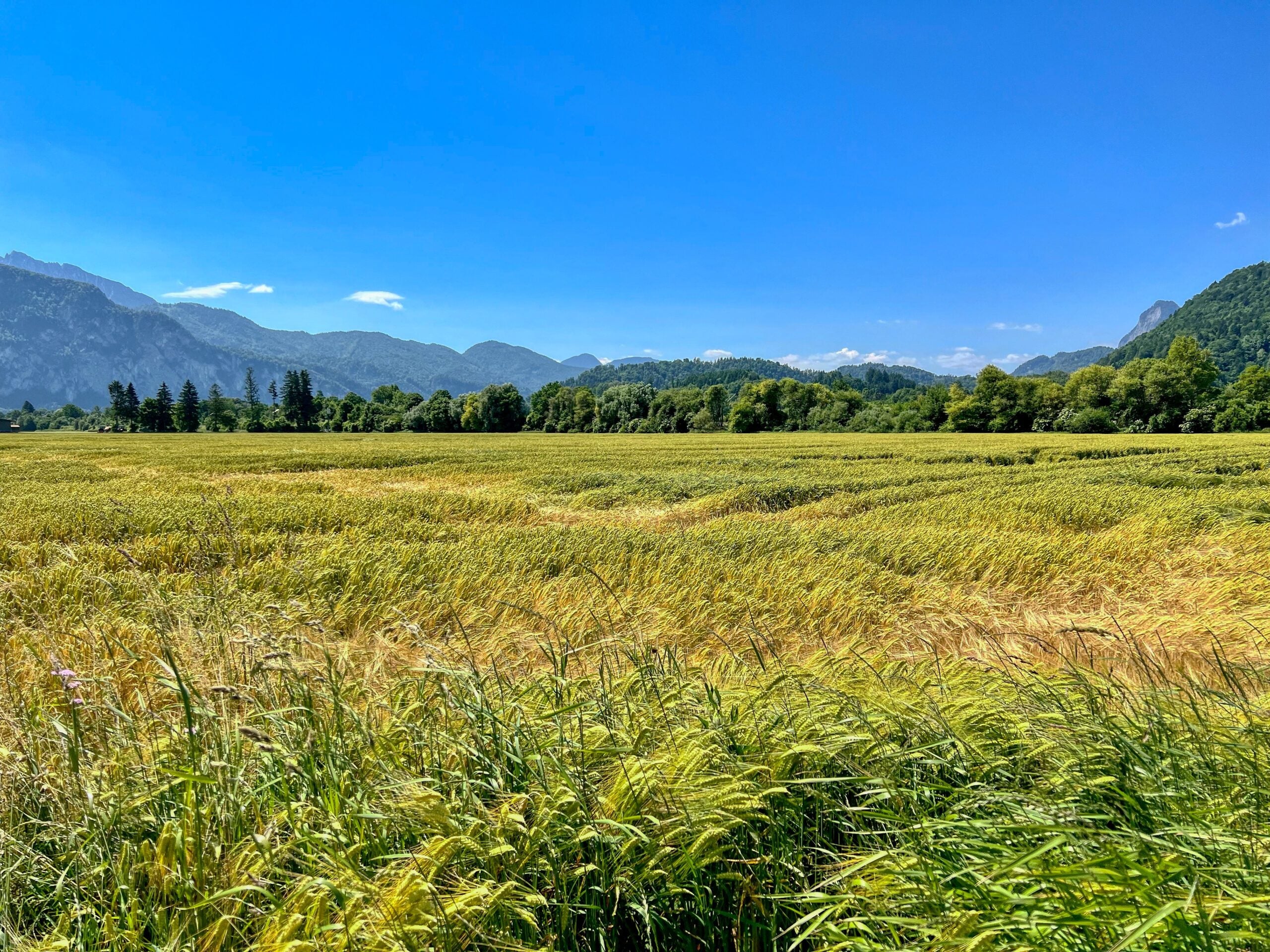
Wheat field near Oberaudorf in Bavaria, Germany by Uwe Schwarzbach.
At the same time as farmers were protesting in European capitals to demand more certainty for their future, the European Environment Agency published a report highlighting serious climate risk to food security. The European Climate Risk Assessment identified 36 major climate risks for Europe related to food, ecosystems, health, infrastructure, the economy and finance. The assessment mapped the direct and cascading effects of these risks and the hotspot areas for the most serious impacts.
The stark conclusion for food is that “climate impacts on food production (particularly in southern Europe) can cascade to rural and coastal livelihoods, land use, the health of socially vulnerable populations and the wider economy.” The report also warns that while climate-driven food shortages are unlikely because production decreases in some areas may be offset by robust production in other areas, food price increases and volatility are likely.
For Europe overall, drought, heat and overly wet conditions will hurt regional production. Southern Europe already faces critical levels of climate risk. Successive years of prolonged drought and excessive heat have resulted in crop failures and reduced yields to the tune of 60% reductions for corn yields in some southern European countries.
EU policymakers and farmers’ business partners must act urgently to support EU farmers in building resilience to climate risk and adopting climate-friendly farming solutions. This is essential to keep the agriculture sector profitable and productive in a climate-changed world.
Farmer livelihoods are on the line
The EU has had a continued decline in the number of farms and agricultural jobs, mainly driven by the loss of small and medium-sized farms. Smaller operations are more vulnerable to various external shocks, from crop losses and diminished yields due to weather events and pests, to financial shocks from sharp rises in the costs of production (such as fuels, fertiliser, plant protection products and animal feeds). That is why part of the farmers’ protests called for exemption from rules perceived to diminish production, such as the one that requires farmers to take a minimum part of their arable land out of production to provide nature and pollinator benefits.
In response to calls from farmers and the governments of some member states, the European Commission proposed a further review of Common Agricultural Policy incentives that require farmers to use climate-smart practices such as reducing tillage, maintaining soil cover in sensitive areas and implementing crop rotation. Farms under 10 hectares, which is more than 70% of EU farms, are exempted entirely from some obligations, and the controls and penalties system won’t apply for them.
CAP should advance climate resilience
The proposed exemptions are a missed opportunity to use the power of CAP to help farmers be more climate resilient for two reasons. First, the EU climate assessment finds that Europe already underutilizes the potential of CAP to improve climate adaptation. A better path forward would be for CAP to address climate risks head on, quantify the benefits of adaptation measures, and make those measures binding for the regions most at risk from climate change.
Second, the uptake of practices that would hasten the introduction of new crops that are better adapted to changing conditions beside current crops will also be foregone. Instead of exemptions from these practices, governments should prioritize supporting farmers in the uptake of farming methods that help the environment and make their holdings more resilient.
Banks play a crucial role too
Farmers’ financial partners also experience climate risks to agricultural production. A 2022 survey conducted by EDF and Deloitte found that 49% of agricultural banks in the EU view climate change as a material risk to their businesses. Nearly all (98%) of respondents experienced at least one negative impact from weather changes or extremes over the last five years. Banks in the EU also see some business opportunities from addressing climate change, with 54% expecting climate impacts to bring new business opportunities.
Agricultural banks can mitigate their risk exposure and seize new business opportunities by including climate risk in their decision-making and by developing innovative financial products that support farmer customers in transitioning to more resilient farming practices.
Long before farmer frustration erupted in the streets, farmers had legitimate concerns about having sustainable livelihoods. Climate-smart farming benefits the long-term financial future of EU agriculture and is essential to meeting the EU’s 2030 climate targets. This new assessment of the severity of climate risk for the farming sector makes delivering joint wins for the environment, livelihoods and food production all the more urgent.